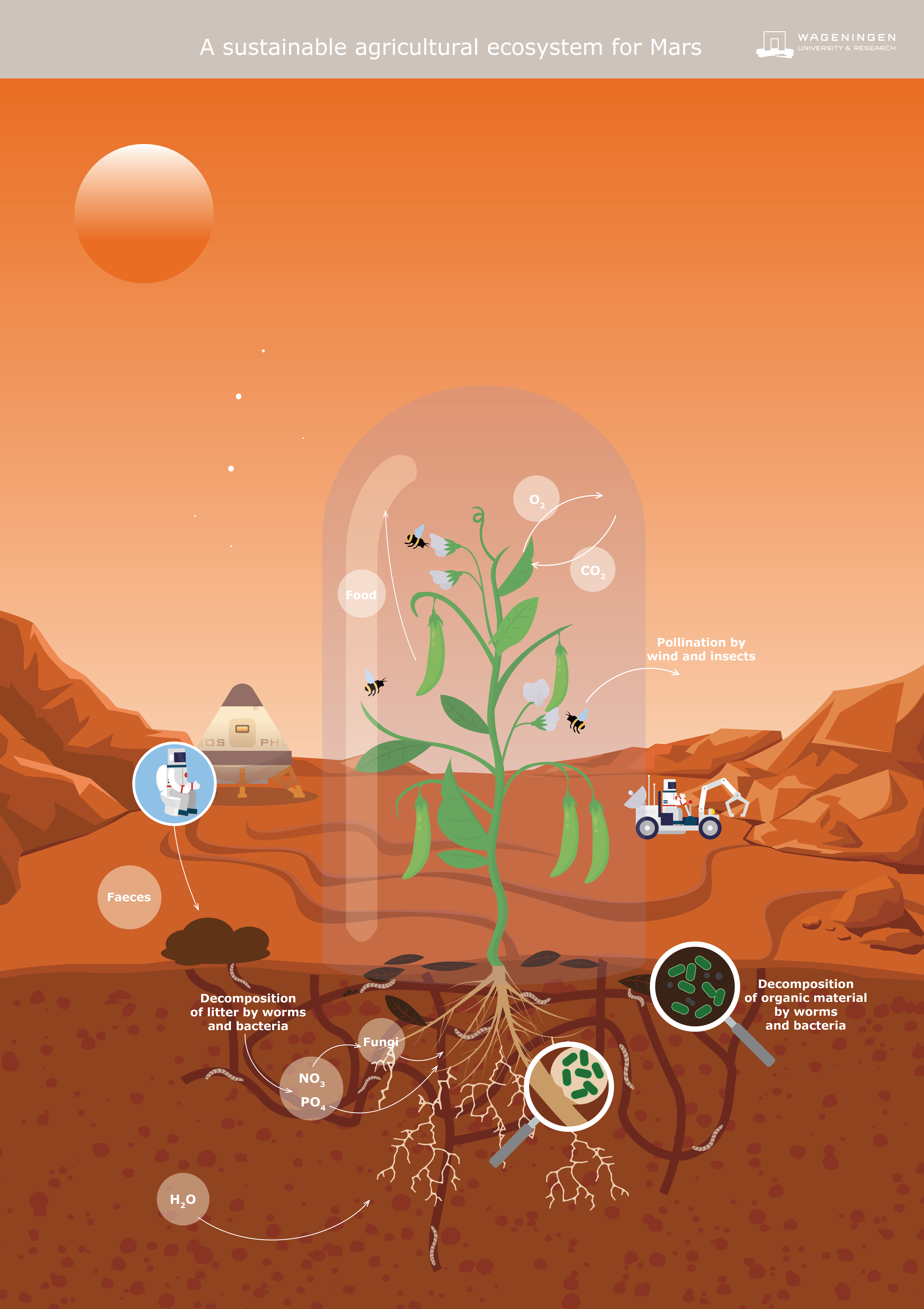
Do you also support the crowdfunding campaigns of the University Fund Wageningen? With this you make projects possible by and for researchers and students of Wageningen University & Research, and contribute to developments in the fields of healthy food and a sustainable environment.
Astronauts urine as manure for vegetable growth on Mars
“As an exobiologist (space farmer) at Wageningen University, and as a big science fiction fan I cannot imagine a more fun and exciting adventure than the journey to Mars or the Moon to establish a human settlement there. Sounds like science fiction to you? Not to me! By conducting scientific research we can make the epic journey to Mars possible.” – WUR researcher dr. ir. Wieger Wamelink
The moment when humans will set foot on Mars is coming closer every day. And maybe they will once live there permanently. To facilitate that we need proper research into life on Mars now. During the next step in our research project Food for Mars & Moon to feed the future inhabitants of Mars and the Moon, we will investigate if urine can be safely used as manure to let plants grow on Mars soil simulant.
To buy Mars soil and seeds, but also to properly analyse the harvested vegetables to investigate if they are safe to eat, we need your support. Will you contribute to a future in which humans can live on Mars or the Moon? Support us with a donation. All help is welcome!
Update may 2020
The crowdfunding campaign is extended! The project is running and the effect of adding urine to Mars and Moon soil simulant is clearly visible. Our first estimation shows that it may yield significantly more beans, up to five times as much. That is good news for future astronauts. But your support is still much needed. The analyses of the harvested beans also cost money. We would like to know exactly how many nutrients from the urine have transferred to the beans. And is it safe to eat them? Also, we want to investigate the soil itself and the added urine (struvite). All together that costs about €10.000. Support us and become part of this big adventure!
Why this project?
With help of crowdfunding, in earlier research we have shown that vegetables grown on Mars soil are tasty and healthy. But just like on Earth, on Mars and the Moon you need manure to grow crops. Without manure, no plant growth. Importing manure by rocket or winning it on the planet itself is expensive and time consuming. The astronauts who want to live on Mars or the Moon in the future will have to look for other solutions, and we are helping them.
The shortage of manure means that not only plant left-overs that have not been eaten need to be put back in the ground, but also that the astronauts will have to use their own faeces and urine. And do not forget to bring the poo and pee from your travel to Mars or the Moon. Upon arrival the faeces can then immediately be used to fertilize the soil.
We start this experiment with urine. Water treatment facilities can purify urine into struvite, a very good fertilizer that is guaranteed free from diseases. In this way we take the next step in the direction towards our final goal: being able to feed a Mars colony in a closed sustainable agricultural ecosystem.
This experiment is the next step in our effort to feed future colonists on Mars and the Moon. But we will also learn more on how to turn infertile soil (again) in to productive soil, which may have useful applications on Earth as well, for example in deserts, but also in the Netherlands where closed sustainable agricultural ecosystems
Crowdfunding
We are still pioneering with emulated Mars soil stimulant. This makes funding the project through regular means hard, making us rely on crowdfunding. In this way, however, everyone can contribute and be part of the biggest adventure of the 21st century.
The donations will be used to buy materials, renting the greenhouse and the hire of greenhouse personnel assisting the research. For the first time we will use an automated water supplying system based on sensor readings in the Mars soil simulant. We have to purchase Mars soil simulant and seeds. And of course, the harvested beans will need to be tested on heavy metals and nutrients: how many calories do they contain? All of this is not possible without your support. Donate now and follow our experiment via YouTube or Facebook. There’s a reward for every donation.
‘Our research will be one of the most important steps towards a self-sustainable settlement of humans on Mars, recycling of urine. Without this a Mars settlement will not be possible.’ – Wieger Wamelink, principal researcher Food for Mars & Moon


